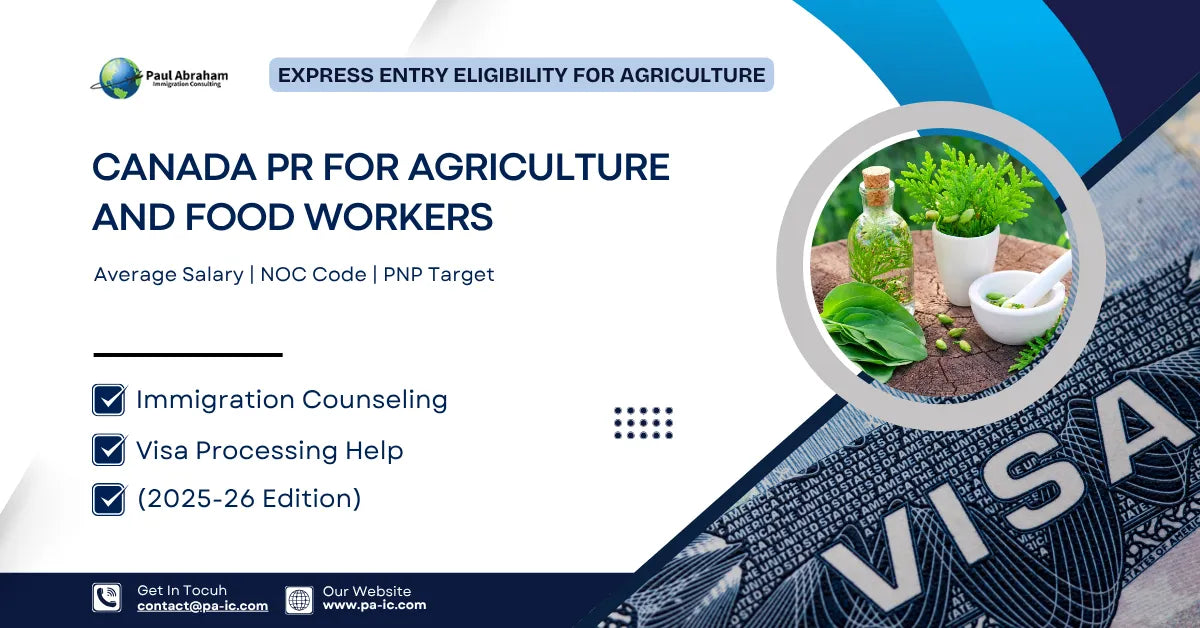If you're a skilled worker in farming, livestock, meat processing, or food production, Canada is actively welcoming you. With sector-specific immigration streams and targeted Express Entry draws, now is the perfect time to plan your permanent residency (PR) journey. Agriculture workers planning to move to Canada must know their NOC code, CRS scores, latest draw invitations, IRCC updates, and government benefits for farmers and related occupations.
Last Express Entry Draw – Agri-Food Category
The last category-based Express Entry draw for Agriculture and Agri-Food occupations was held on February 16, 2024:
- Invitations issued: 150
- CRS cut-off: 437
A new draw in this category is expected in Q3 2025—likely between August–September.
Express Entry Eligibility For Agriculture and Agri-Food Occupations
- Work Experience: Minimum 1 year full-time (or equivalent part-time) in past 3 years
- Language Test: IELTS General (CLB 5 or above recommended)
- Education: Secondary school or higher, plus ECA (Educational Credential Assessment)
- Age: No strict limit, but younger applicants (under 35) earn more CRS points
- Settlement Funds: CAD 13,757 for a single applicant (2025 figure, updated annually)
- Valid Job Offer (optional): Strongly improves chances under PNP
NOC Codes List For Agriculture Sector Occupations
Some key eligible NOC codes in agriculture and agri-food sectors include:
- 82030 – Farm Supervisors & Contractors
- 84120 – Specialized Livestock Workers
- 85100 – Livestock Labourers
- 85101 – Harvesting Labourers
- 92012 – Food and Meat Processing Workers
- 82031 – Greenhouse & Horticulture Managers
You must match the job duties listed under the relevant NOC codes and have appropriate experience to qualify under Express Entry or PNP programs. Note that the immigration process may differ for regulated and non-regulated NOC codes, so be sure to verify your code before applying.
Agriculture Specific Immigration Stream
Canada is working on a new immigration and work permit stream tailored specifically for workers in the agriculture and fish processing sectors. This upcoming program is part of IRCC’s effort to address long-standing labour shortages in these essential industries.
- Set to launch between late 2025 and early 2026, the new stream will make it easier for temporary foreign workers in agriculture to transition to permanent residency.
- One exciting feature of this program is that it may include partnerships with select countries, helping Canadian employers recruit skilled workers faster and more efficiently.
If you qualify under this agriculture worker stream, you won’t have to rely solely on older pathways like the Agri-Food Pilot or Provincial Nominee Programs (PNPs). This could become the most direct and flexible route to Canadian PR for thousands of agri-sector professionals.
Provincial Immigration Targets (2025–2026)
Canada has significantly increased its agri-labour intake. Here's what provinces are targeting for 2025–2026:
- Ontario: 2,500+ agri-food PR allocations
- Alberta: 1,800 farm and food sector workers
- BC & Manitoba: Priority streams for meat processing, harvesting
- Saskatchewan: Farm workers needed in rural municipalities
These targets will be filled through Express Entry, Provincial Nominee Programs (PNPs), and new sector-specific streams.
High-Demand Agriculture Sector Workers for 2025
From Ontario, which has the highest demand, to Saskatchewan with the lowest, most provinces require workers in the following agricultural sectors.
- Field and livestock workers
- Farm equipment operators
- Food and meat processing technicians
- Greenhouse and horticulture specialists
- Agricultural service contractors
Machine-Specific Skills For Farmers In Canada
You don't need to operate advanced machinery to immigrate, but it helps if you can demonstrate:
- Familiarity with harvesters, tractors, greenhouse control systems.
- Experience in packaging, grading, and food safety systems.
- For meat/fish processing: knowledge of cutting, chilling, sanitation, and HACCP.
Employers in Canada prefer candidates who already know how to handle farm tools or can adapt quickly.
Average Salary in Canada for Agri-Food Workers
Here's a general salary guide:
| Occupation | Avg. Annual Salary |
|---|---|
| Farm Supervisor (NOC 82030) | CAD 48,000 – 70,000 |
| Meat Cutter (NOC 92012) | CAD 40,000 – 58,000 |
| Livestock Labourer (NOC 85100) | CAD 35,000 – 50,000 |
| Greenhouse Worker (NOC 85101) | CAD 32,000 – 45,000 |
Government Programs & Benefits for Farmers
Canada supports agri-workers through multiple channels:
- Agri-Invest Program – Savings-matching for farmers
- Farm Credit Canada Loans – Affordable loans to start or expand farms
- Newcomer Settlement Support – Access to language classes, housing help, and family integration
- Job Bank Matching – Registered workers can be matched with employers in shortage areas
Once you become a PR, you gain access to healthcare, free school for kids, and eventually, citizenship.
Final Thoughts
Whether you're an experienced field worker, greenhouse specialist, or food processor, Canada always welcome these occupation workers with goverment policy benefits. Stay updated on the last draws for agriculture sector, prepare your documents as per your immigration program, and take advantage of new sector programs launching soon.
If you'd like help with your application, job offer, or settlement plan, feel free to reach out to PAIC.

